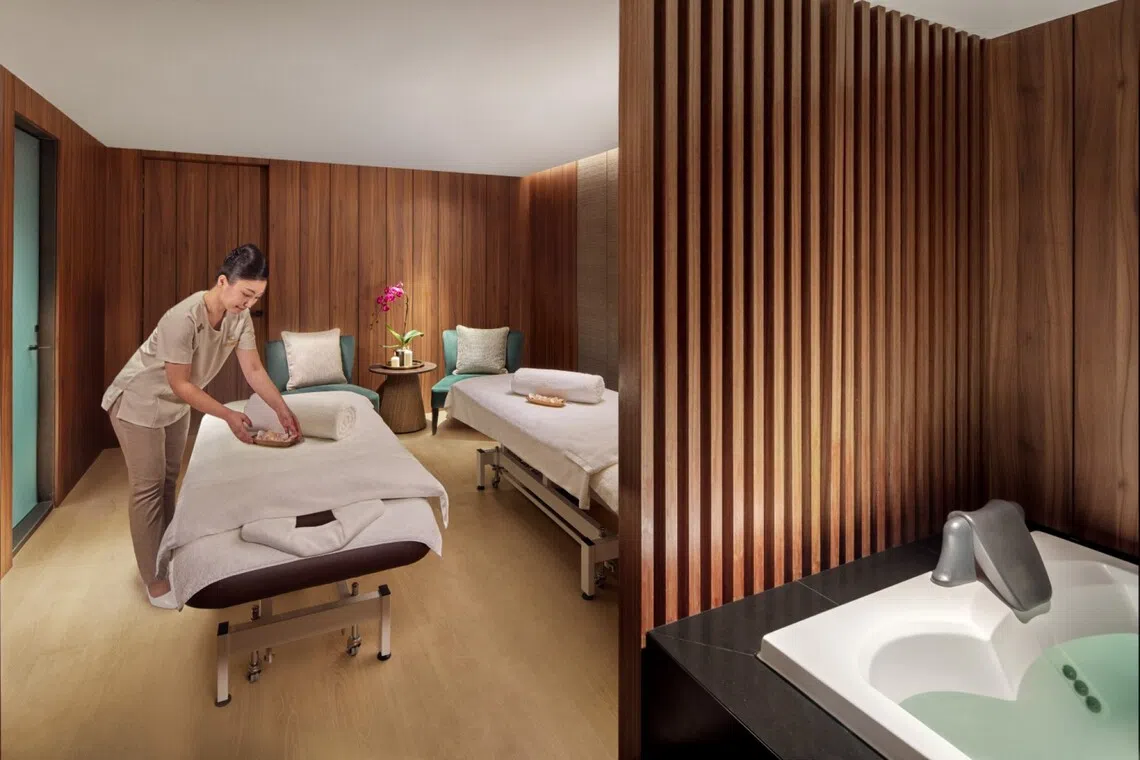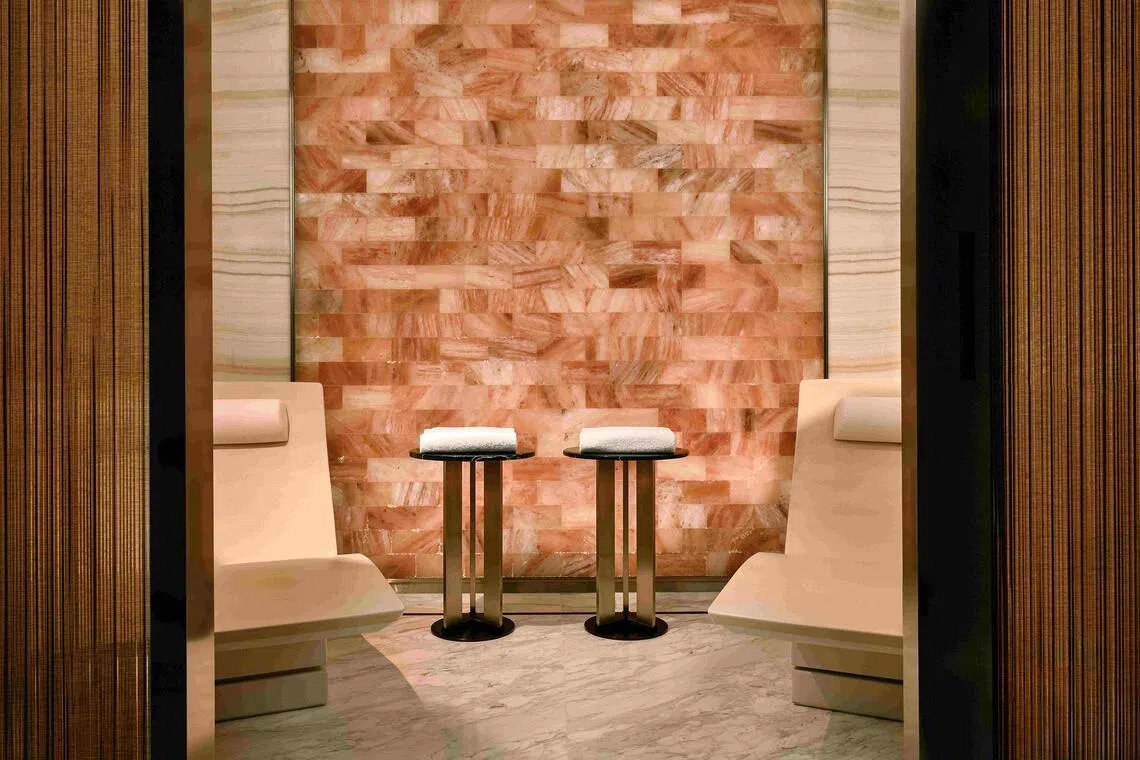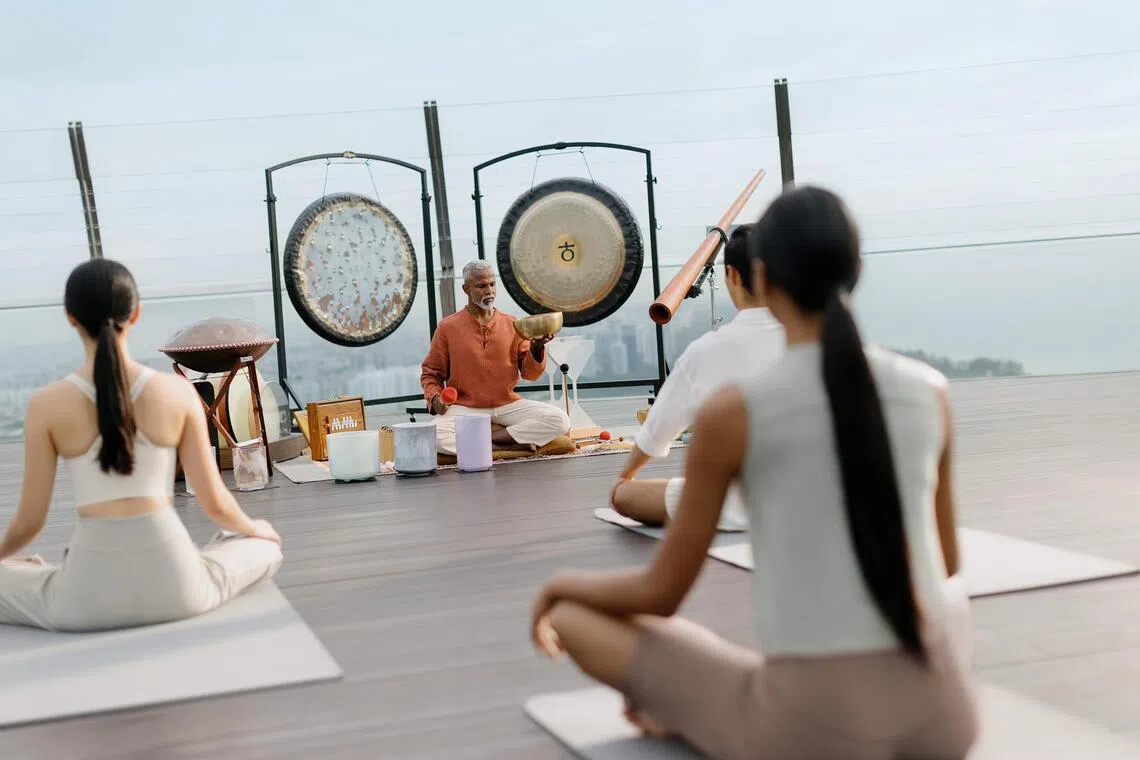Destination wellness
As people increasingly dedicate time and travel to well-being, hospitality companies are responding with ever-more tailored offerings
[SINGAPORE] Even if five-day return-to-office work weeks are fast resurfacing, one encouraging trend shows we haven’t forgotten everything the pandemic taught us. Demand for wellness offerings has been on a steady post-Covid climb – perhaps the only sign, as humans hurtle back to old ways, that we’re keeping personal well-being a priority.
In particular, wellness tourism is exploding. The industry is expected to be worth around US$1.35 trillion by 2028 – more than doubling in size from 2022, when it stood at US$637 billion. And wellness tourism has been identified as one of the top three growth areas across the behemoth wellness industry. (There’s even a handy new Lululemon shop at Changi Airport Terminal 1, for whenever you forget to pack your leggings on the way to that Bali yoga retreat.)
It’s easy to see why people have developed a taste for wellness breaks. Communications professional Dawn Chin, a frequent wellness traveller, says: “What I love most about such retreats is that each destination offers its own lessons on what wellness looks like. From sunrise meditation in Indonesia, to yoga in the serene valleys of Sri Lanka and the humbling peaks of Bhutan, every retreat brings together people from different corners of the world who arrive as strangers and leave as friends who’ve experienced profound transformation together. These sacred spaces remind us that wellness and healing isn’t just a personal journey – it’s a collective experience that connects us all.”
According to Booking.com’s Travel Predictions 2025 research, the majority of travellers in Singapore and the Asia-Pacific region now see a vacation as more than just time to unwind, with wellness retreats being key motivators. Anthony Lu, the platform’s regional director of South-east Asia and China, observes: “The value of rest, reflection and personal renewal has certainly increased post-pandemic. The full rebound of travel is mirroring this shift, evolving beyond a physical escape to become a meaningful pursuit of mental well-being.”
A new world of wellness
Speaking of evolution, the definition of wellness itself is becoming increasingly distinct. As the market becomes more sophisticated, sub-trends are emerging, painting a picture of just how people are looking to take care of themselves. Among these, longevity retreats are emerging as one of the biggest swings to watch, Booking.com data shows. “With over half of Apac and Singapore travellers willing to pay for a vacation whose sole purpose is to extend their lifespan and well-being, the shift underscores a growing desire for sustainable, long-term health solutions, moving beyond the traditional wellness itineraries of the past,” says Lu.
Meanwhile, Hilton, the fastest-growing hospitality group in Apac, has recorded a growing sleep tourism trend across its properties. “Nearly half of global travellers avoid setting an alarm on holiday, and two in five say a hotel’s sleep offerings influence their booking decisions,” says Alexandra Jaritz, Hilton’s senior vice-president of brand management in Asia-Pacific. “Among luxury travellers, 70 per cent are choosing hotels with sleep-enhancing amenities, pointing to the growing demand for restorative stays.”
Navigate Asia in
a new global order
Get the insights delivered to your inbox.

To tap this, the global hotel giant has rolled out programmes such as a “sleep concert” in Shanghai, in partnership with the Bund 31 Performing Arts Center, and a sleep yoga experience under the stars at Hilton Maldives Amingiri Resort & Spa. They’re just two examples of how businesses are becoming increasingly innovative in their approach to attract wellness seekers.
Still, when it comes to creative offerings, no property has upped the ante quite as much as Cempedak Island. In the past few months, the private eco-resort off the coast of Bintan has launched two initiatives tailor-made for the current wave of wellness-seeking adventurers. Its immersive Murder Mystery Weekend allows guests to solve a whodunnit-style game in between beachside massages and cocktails, while an Island Wellness Retreat plugs sound healing, breathwork, cold plunging and other au courant modalities by external experts into a weekend programme at the resort, where the natural environment only amplifies their impact.

“I do think the wellness trend is evolving,” says Leanna Crowley, Cempedak’s marketing communications manager. “People are now getting more niche – branching out and really getting into things like yoga and pilates, contrast therapy and breathwork, or fitness through the likes of hyrox. But beyond wellness, we have also seen people seeking experiences that feel unique and a bit more personal. There’s just so much out there now, so standing out with thoughtful experiences and great service really matters.”
Jasjit Assi, general manager at Four Seasons Koh Samui – one of the year’s hottest wellness properties following season three of The White Lotus – affirms this. He says: “In today’s evolving wellness landscape, authenticity and personalisation are more important than ever. For us, wellness must reflect not only global trends but also the character of the destination, the rhythms of local life, and the intention behind the guest’s journey.”
Wellness everywhere
While wellness travel was largely a subset of leisure travel in the past, those boundaries are now changing. For one thing, hotels are noting a growing demand for wellness elements among those who aren’t travelling for leisure. Both Marina Bay Sands (MBS) and Parkroyal Collection Marina Bay, for example, have registered rising requests from the corporate tourism sector to integrate wellness into work events.

“Wellness has become intrinsic to how people live, travel and recharge,” says Parkroyal Collection Marina Bay general manager Phil Smith. As a result, he notes, the hotel has “seen considerable interest from corporate and Mice (meetings, incentives, conventions and exhibitions) delegates looking to incorporate wellness into their meeting programmes”.

In Parkroyal’s case, this could take the form of farm-to-table bento lunches made with herbs from its urban farm, or a mobile spa experience conducted by the hotel’s St Gregory Spa. Meanwhile, MBS has launched a programme called Thrive that encompasses a suite of physical, mental and intellectual well-being sessions which aim to enhance conference delegates’ focus during events. That’s in addition to the recent overhaul of its guest rooms, where – depending on which you book – you could even have a personal spa with a Himalayan salt wall, or a top-of-the-range massage chair in-suite.

How will this widespread emphasis on wellness as we travel impact the way we lead life at home? Like F1 cars after a pit stop, will it give us more finely tuned bodies and better bowel movements, or make us less crotchety on the road and in the workplace? Research from the Global Wellness Institute suggests that for every US$844 annual spend per person, happiness levels increase by 7 per cent, and for every US$769 spent per capita, life expectancy is extended by 1.26 years. This is, of course, tough to prove. But if the data turns out to be accurate, if demand for wellness remains strong, and if the treatments that hotels and spas et al continue to develop are effective, maybe – just maybe – we’re headed towards a more well world.
Decoding Asia newsletter: your guide to navigating Asia in a new global order. Sign up here to get Decoding Asia newsletter. Delivered to your inbox. Free.
Copyright SPH Media. All rights reserved.






